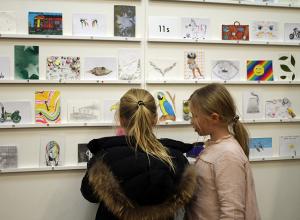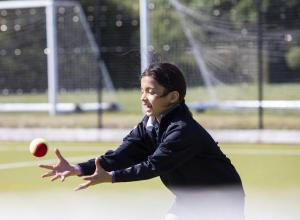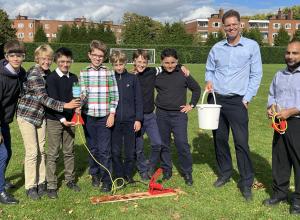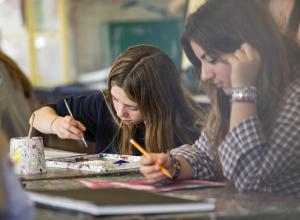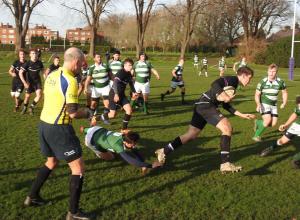
It's great that children today are more willing than ever before to tell their parents what they think and feel and that parents are happy to listen. But, argues Andy Woodward, as well as listening, being a good parent still involves challenging our children's ideas when we disagree.
Some things change. And some things stay the same.
I am pretty sure that, even back in Tudor times, parents raising a child would encounter much we would recognise along the way; the mistakes made, the desire for approval, the many moods - perhaps linked to friendship issues or self-esteem. Perhaps they were worrying about their child’s development, relative to others, and certainly about their health. But there were also, to state the obvious, differences beyond measure. Theirs was a time of harsh physical punishments, of children sent early to work and, above all, they almost certainly never worried about TikTok.
There are great benefits in the fact young people now seem more able to talk to their mum or dad, including about how they’re actually feeling
Andy Woodward, Deputy Head, Harrodian Senior School
Still, to narrow the scale of comparison, it seems that parents today (and I speak as one), for all that is the same as when we ourselves were raised, find ourselves navigating a whole different set of expectations. One aspect that has developed since our own dear mothers and fathers were in the firing line has been the sheer amount of resource expended on parenting – both in terms of finance and time. A 2018 New York Times article entitled ‘The Relentlessness of Modern Parenting’ showed the boom in annual expenditure on education, care and goods for younger children since 1980. For the highest quintile of earners, the bill had apparently increased (in inflation-adjusted terms) from $6,000 to over $10,000 per year – a near doubling. But even more notable were the new demands on time, with mums who in 1975 spent, on average, less than two hours per week engaged in ‘educative’ activities with their child (eg reading to them, doing crafts, helping with homework), now finding themselves doing so for five hours a week… and the dads are catching up too.
So, are our youngsters any happier or better equipped for life as a result? Now that they are more likely to be growing up shoulder to shoulder with their parents at the kitchen table (between being taxied by them to various practices and recitals), rather than playing, unattended, in the road or local field? I’m not sure there’s an easy answer to that. Indeed, there’s every chance that some resilience and independence is being lost along the way, the ‘Current Mental Health Crisis’ standing as Exhibit A for the prosecution… But then there are great benefits in the fact young people now seem more able to talk to their mum or dad, including about how they’re actually feeling. We quite often ask our pupils, and their parents, questions around their ability to communicate with one another and, for all the worries we carry, it is really heartening how often it seems that problems, fears and misjudgements ARE actually being disclosed when it matters. It may be the case that parents who have grown up more involved in the day-to-day interests and challenges of their children are more switched on when it comes to picking up on what happens next, even as their offspring begin naturally to pull away and share less often.
There is not the same divide of incomprehension and taboo that kept me, and almost all of my friends, from really telling our parents what was happening in our lives.
To return to the early comparison, my teenage years, while relatively straightforward, did still see me: being mugged (twice! By the same people!), get very close to suffering a traumatic and dangerous incident involving a predatory adult, go through the suicide attempt of my best friend… And, in each case, I either kept it from my parents entirely or, if that couldn’t be achieved, I certainly never actually spoke to them about it (and, to be clear, these are lovely parents!)! I know that different views exist as to whether all the contemporary PSHE chat, whether around mental health, RSE or whatever, is always a good thing all the time. But the increased awareness, the vocabulary, the frame of reference… they are definitely leading to more conversations at home. And that has to be a good thing. There is not the same divide of incomprehension and taboo that kept me, and almost all of my friends, from really telling our parents what was happening in our lives. For all that the shutters may go up somewhat in the teenage years, it is encouraging that my 9-year-old daughter naturally talks to us about what worries her… or what she learned about the human body in school.
But there is a next step that I feel we should sometimes pay more attention to. Listening doesn’t always mean agreeing! Part of parenting remains to challenge childish assumptions and responses, not to assume that our child’s every whim and desire is a to be indulged or encouraged. This doesn’t mean we are not to take them seriously. It doesn’t mean, if they are in trouble, that we assume it’s their fault (although it might be!). Or, worse, to dismiss them with the idea that they are ‘being silly’. In fact, unless your child is actually walking on their hands or balancing cushions on their head while putting on a funny voice, “you’re being silly” may be the most dangerous and crushing words of all. Even if they were planning to share nudes with someone they fancy, or subscribing to follow a right-wing extremist online… well those things may well be very silly indeed, but at once saying so is probably the best way to kill the necessary conversation and ensure they go ahead and do it to spite you.
Part of parenting remains to challenge childish assumptions and responses, not to assume that our child’s every whim and desire is a to be indulged or encouraged.
Anyway, I digress. Listening, yes. Agreeing, not necessarily. Because:
If a child thinks their teacher hates them or picks on them… well, the teacher doesn’t, in all likelihood, actually hate them or pick on them.
If a child thinks they should drop Spanish GCSE…
If they think they should be in the set above, or in the other form…
If they think they never want to speak to their best friend ever again…
If they really want to go to the unsupervised sleepover…
If they really don’t want to go to school tomorrow…
If they want to dye their hair green on a school night…
If they believe they are suffering from depression after a self-diagnosis based on online research…
These things aren’t necessarily true or wise. It may be their teacher actually knows best about what set is best for them. It may be they are in the throes of a hormone-fuelled over-reaction. And it really may be that you know better, and have more valuable lived advice to input.
Let’s listen. Let’s affirm, ensuring that our children know their feelings, views and experiences are legitimate and worth hearing. But let’s not necessarily always tell them they’re correct.
I hope this sense of self-confidence isn’t being lost to parents. Some do seem to fight the battles of their children pretty indiscriminately, delegated even to join in their friendship dramas or debates around who gets invited to the party. Let’s listen. Let’s affirm, ensuring that our children know their feelings, views and experiences are legitimate and worth hearing. But let’s not necessarily always tell them they’re correct. You are their best source of wisdom, knowledge and experience. You are someone with the right and authority to suggest that maybe they should persist with Spanish, even though it’s tricky. That it’s worth forgiving a friend. That it’s normal to feel sad sometimes, especially after a break-up, but that they will get through it… so should get back on the bike (literally - bike rides are great for mental health!). That tough times are part of life, that they have to be faced… so, yes, they should still go into school tomorrow.

Andy Woodward is Deputy Head of Harrodian Senior School. He welcomes feedback to this blog at website@harrodian.com

